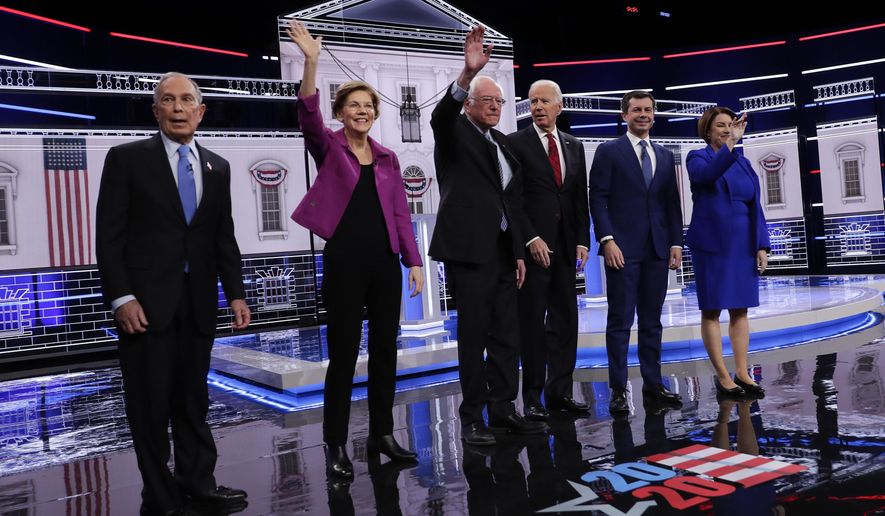The unexpected death of Supreme Court Justice Antonin Scalia on the day of the 2016 Republican debate in South Carolina made the high court a top issue in the race and ultimately rallied conservative voters to help put Donald Trump in the White House.
This time, as 2020 Democratic hopefuls prepare to take the debate stage in Charleston, South Carolina, the tilt of the Supreme Court is barely a blip on the radar.
Some primary candidates have suggested the idea of court-packing, but the issue of potential Supreme Court vacancies hasn’t been raised much — if at all — in the nine debates the Democratic Party has held.
The lack of sparring over Supreme Court picks is all the more notable given the advanced age of several of the justices.
A number of the candidates could be running on Supreme Court nominations and using their personal connections to the high court to underscore the issue, said Elisha Savchak-Trogdon, a policy studies professor at Elon University in North Carolina.
She noted that former South Bend, Indiana, Mayor Pete Buttigieg in part owes his marriage to husband Chasten to the Supreme Court ruling that legalized same-sex marriage.
She also pointed to former Vice President Joseph R. Biden, who as chairman of the Senate Judiciary Committee for decades helped shaped the Supreme Court by confirming and blocking nominees.
“They have an opportunity to speak about that in an authentic way and they don’t seem to be capitalizing on that the way they should be,” Ms. Savchak-Trogdon said.
The top seven contenders in the Democratic presidential race again will have a chance to discuss potential Supreme Court picks when then meet on the debate stage Tuesday night in Charleston, just days before the Palmetto State’s first-in-the-South primary Saturday.
The Charleston debate also marks the final face-off before next week’s Super Tuesday primaries, when 14 states cast ballots.
Billionaire Tom Steyer will join the six top candidates who debated last week in Nevada: Mr. Biden, Mr. Buttigieg, Sen. Bernard Sanders of Vermont, Sen. Amy Klobuchar of Minnesota, Sen. Elizabeth Warren of Massachusetts and former New York City Mayor Michael Bloomberg.
Mr. Bloomberg, a billionaire media mogul who is self-funding his run, isn’t on the ballot in South Carolina. Instead, he focused his campaign on the Super Tuesday states, where he hopes to win big and gain frontrunner status overnight.
Richard Pacelle, a political science professor at the University of Tennessee-Knoxville, said the Democrats are skipping over Supreme Court nominees to get to subjects where they clash more violently, such as on health care.
He called it a mistake.
“You are looking for the distinctions between the candidates rather than the things they agree on,” he said. “But I think they do this to their own peril.”
Another reason the Supreme Court hasn’t been a focal point is largely because Democratic-appointed justices are a safe “liberal” vote, said Curt Levey, president of the Committee for Justice.
He said Republican voters are more motivated by court vacancies since they have been let down by GOP-appointed justices who turn out to be more moderate on the bench than expected, such as retired Justice Anthony M. Kennedy, who reigned as the court’s “swing vote” until he retired in 2018.
Several of the Democratic contenders — Ms. Warren, Ms. Klobuchar and Mr. Biden — have said they would appoint judges to the federal judiciary who would uphold Roe v. Wade, stressing the importance of a woman’s reproductive rights.
Mr. Buttigieg and Mr. Sanders have suggested ways to rotate judges or add up to 15 new justices to the high court as a way to counterbalance the 5-4 conservative majority that President Trump helped to cement with the appointments of Justices Neil M. Gorsuch and Brett M. Kavanaugh.
Terry Madonna, polling director at Franklin and Marshall College, said an increase in the discussion about the courts could further energize progressive voters, who are already highly motivated to oust Mr. Trump.
“My sense is that it would aid in terms of motivation. But boy, voters are very highly motivated right now,” Mr. Madonna said.
Mike Davis, president of the Article III Project that backs Mr. Trump’s judicial nominees, said recent history shows Republicans have benefited the most from judicial vacancies.
He pointed to the death of Scalia as helping move Republican voters to the polls in 2016. He also noted that several Senate Democrats were voted out in the 2018 midterm elections after the confirmation hearings of Justice Kavanaugh, which became highly partisan after unproven sexual misconduct allegations dating back decades were lobbed at the president’s nominee.
“The American people want judges who apply the law instead of making up the law, and the types of judges who the Democrats want to nominate would scare the heck out of American voters,” Mr. Davis said.
Dan Goldberg, legal director for the Alliance for Justice Action Campaign, pushed back, saying liberal voters are galvanized like never before on the issue of judicial nominations.
A poll conducted for Alliance for Justice Action Campaign and other groups last June revealed 43% of likely 2020 voters said a Supreme Court appointment is a reason to back a Democratic nominee, while only 35% said it is a reason to vote for Mr. Trump.
“Both polling and on the ground experience demonstrates that progressive voters are galvanized like never before on the issue of courts. You saw this during Kavanaugh,” he said.
• Alex Swoyer can be reached at aswoyer@washingtontimes.com.




Please read our comment policy before commenting.